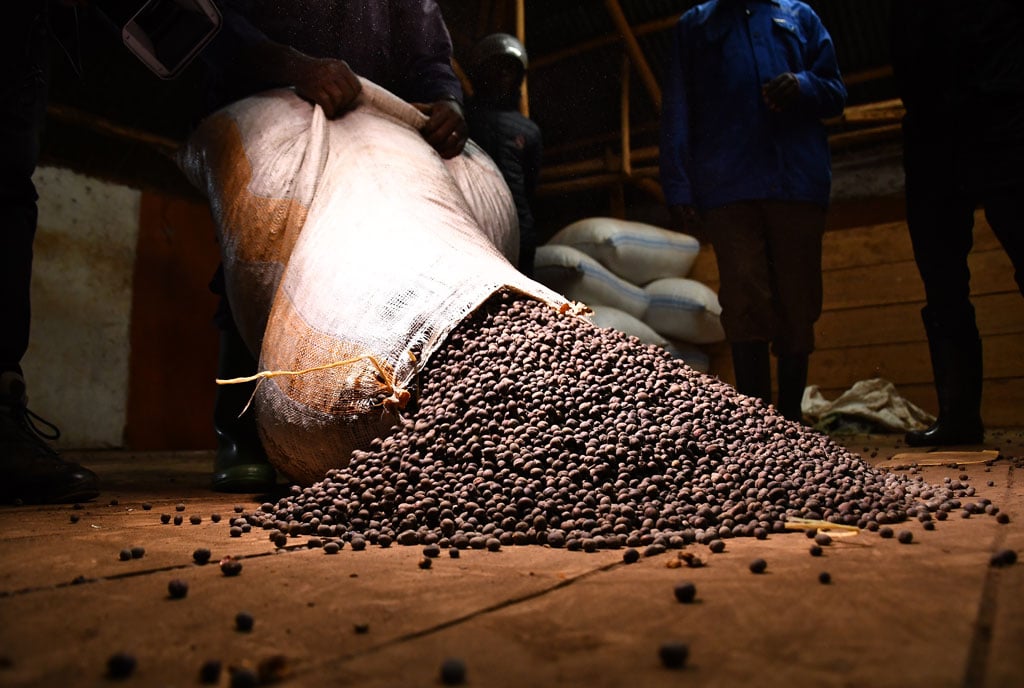
Mr Nathan Nandala Mafabi, the chairperson of Bugisu Cooperative Union (right), inspects a coffee plantation in Bugisu last year. Mr Mafabi says coffee is one of the most treasured commodities after oil. PHOTO | FRED WAMBEDE
President Museveni’s televised address to the nation Thursday night went to great lengths to drill the final nail in the coffin of the Uganda Coffee Development Authority (UCDA).
Formed by an Act of Parliament 1991 that was amended three years later, UCDA stepped into the shoes of the much-vaunted Coffee Marketing Board with a mandate “to promote, regulate and oversee the quality of coffee along the entire value chain.”
UCDA also set out to “support research and development, promote production, and improve the marketing of coffee in order to optimise earnings for coffee stakeholders and the country.” This past workweek, on November 6, the House dissolved the government agency after passing into law the National Coffee Amendment Bill, 2024.
UCDA’s functions were subsequently incorporated into the Ministry of Agriculture, Animal Industry and Fisheries (Maaif) that has in its stable semi-autonomous institutions like the National Agricultural Research Organisation (Naro).Case for… On Thursday night, in an address that at times dripped with venom, President Museveni stopped short of calling UCDA’s top brass fat cats. He nevertheless said the officials should be “punished legally” after getting fat cheques for riding on the coat-tails of Naro and Operation Wealth Creation (OWC).
“While the people at UCDA were getting high salaries, the people at Naro were getting low salaries. Like us the freedom fighters […] We of NRM and Fronasa [Front for National Salvation] always work for patriotism and not money,” Mr Museveni said, adding, “These side government agencies like UCDA, DDA [Dairy Development Authority] and Unra [Uganda National Roads Authority] were temporary measures I accepted at the beginning of our government mainly because of low pay for our public servants and their low enthusiasm for work.”
The President also said he yielded with reluctance and against his better judgement to the inception of autonomous government agencies like UCDA and Unra, both of which were dissolved on November 6.
“The logic was that for particular projects, in order to ensure their implementation, create the agencies so that the project is implemented. I didn’t fully accept this logic, but I also didn’t oppose it because we had serious problems at the time,” Mr Museveni said.
Nsegumire Kibedi (Mityana North), one of the lawmakers whose collective aye on November 6 gave the green light to dissolve UCDA, submitted that the government agency had established a track record of “harassing coffee farmers.” The dissolution of UCDA, the Mityana North lawmaker added, “is a blessing in disguise because this will allow extension workers to focus on their work better in popularising the coffee.”
Case against…
In an interview with Monitor, Nathan Nandala Mafabi, the Budadiri West lawmaker who hails from the coffee-growing Sub-region of Bugisu, said life after UCDA will not be as rosy as the Museveni administration wants many to believe.
"The regrets that we are going to have is that most likely we are going to be off the accreditation list in the world and that would take us some time to regain it. It may take us a minimum of five years. So the regret is that we have passed a law which is going to affect people,” Mr Mafabi said, adding,
“I don’t want people to assume that UCDA is like any other authority. This one was specialised in coffee and coffee is the largest foreign exchange earner for this country.” Uganda follows the East African Standard EAS 105:2020 for roasted coffee beans and roasted ground coffee. This East African Standard, per the catalogue of East African Standards 2023, “prescribes the requirements and methods of sampling and test for roasted coffee beans and roasted ground coffee.” UCDA is a correspondent member of the International Organization for Standardization (ISO) whose International Standard is used for the accreditation of competence of testing and calibration of coffee laboratories worldwide.
When Uganda, back in February of 2022, opted out of the International Coffee Agreement (ICA) 2007 on account of asymmetries between coffee consuming countries in the global north and coffee producing countries in the global south, UCDA’s stock in the accreditation process grew that bit more. The certificates of origin that UCDA issues turned out to be recognised internationally, much to the relief of players in Uganda’s coffee value chain.
"We know the Ministry of Agriculture has no capacity, but they are saying that since they are taking over UCDA. We are yet to know how it turns out," Mr Mafabi, who is also chairperson Bugisu Cooperative Union (BCU), told Monitor.
Transition period
Fears around Maaif’s capabilities, or the lack of, are what occasioned the push for a transition period during the rationalisation of UCDA. When the House committees on Agriculture, Finance and National Economy met President Museveni at State House nearly a month ago over the rationalisation matter, Dr Abed Bwanika, the Kimanya-kabonera lawmaker, successfully lobbied for a transition period. This was on account of the bureaucratic tendencies that have typified operations at Maaif.Ms Linda Agnes Auma, who chairs the House Committee on Agriculture that processed the coffee Bill, submitted on the floor of parliament in support of a transition period nearly a fortnight ago.
"Countries like Kenya and Ethiopia, which attempted immediate rationalisation from the Agency model, to the ministries suffered serious setbacks resulting in reduced coffee production for exports. These countries have since reverted to the agency model,” she said.Adding: “Given the above achievement and commitment of UCDA, the Committee recommends that [it] be rationalised, subject to a three-year transitional period, to enable [Maaif] build capacity to execute the mandate that is under UCDA.”
At the time, even Maaif’s junior minister, Bright Rwamirama, saw a lot of wisdom in the request. He said: "On the justification for the three years, [the] government is sensitive to the stakeholders. And because stakeholders have been informed by dissenting views, [the] government decided to allow a three-year transition to make sure that stakeholders' concerns are flagged so that we move forward.
"Fast forward to November 5, a day before the House passed the coffee Bill into law, Dr Chris Baryomunsi—the ICT and National Guidance minister—told all and sundry at the Uganda Media Centre that the transition period was off the table. During his Thursday night address, President Museveni said that the successes that Naro has enjoyed working within the stable of Maaif is proof that a transition period is not necessary. Maaif, he added, can hit the ground running while running the rule over Uganda’s coffee. Mr Joel Ssenyonyi, the Leader of the Opposition in Parliament, said on Friday that this development provides further proof that President Museveni is intent on having the vast bulk of Ugandans wallow in poverty “because poor people are easier to rule.”
What next?
Mr Mafabi says that the legislation that the House endorsed on Wednesday will doubtless have “a lot of ripple effects.”
“The law has some complications and I am not so sure how they are going to take care of that. But we will leave it in the hands of God [because] there is no permanent situation,” he told Monitor in an interview.
The aforesaid air of resignation was not palpable when we sounded out Mr Robert Byaruhanga, the Uganda Coffee Federation president. UCDA, he said, “has been important in areas of quality control and we are thankful to them for that.” Mr Byaruhanga hastened to add that the transfer of the UCDA functions to Maaif will not affect the coffee prices.
Several questions, however, abound. On October 24, when debate on the National Coffee Amendment Bill, 2024 took centre-stage before the plenary descended into chaos forcing an adjournment, Mr Jonathan Odur (Erute South) pressed government to specifically explain whether UCDA was being dissolved, merged or simply transferred to Maaif. Answers were not forthcoming despite Minister Rwamirama being in the House. While the Bill was being processed on Wednesday, plenary resolved that some of the key staff within UCDA would be absorbed in Maaif. Maj Gen (retired) David Kasura, Maaif’s permanent secretary (PS), affirmed this position on NTV Uganda.
PS Kasura added that focus will be placed on absorbing scientists with speciality in managing the quality of the crop.Even as the country appears to be witnessing the end of what could pass for a soap opera, the government is alive to the fact that the fortunes of the cash crop could turn out to be a handy tool for the Opposition ahead of an electioneering year in 2025. While on a mobilisation tour for his National Unity Platform party in Busoga Sub-region, Robert Kyagulanyi Ssentamu alias Bobi Wine could be seen wielding a coffee branch.
Minister Baryomunsi this past workweek noted that “there has been a lot of propaganda and falsehoods especially regarding the coffee Bill to an extent that some MPs were intimidated that maybe, your political standing shall get low.” He added that his “ministry shall work with the Ministry of Agriculture to come up with information answering the many false things which have been in the public. And we shall support all MPs, whether it requires coming down to the constituencies to explain the patriotic decision which has been taken by Parliament, we shall do so.” In his televised address on Thursday night, President Museveni vowed that the coffee sector will thrive on his watch following the dissolution of UCDA.
“With coffee, we’re determined to add value to it so that instead of a kilogramme giving us $2.5 (around Shs9,000) it gives us $25-40 (Shs90,000-Shs145,000) per kilogramme and creates more jobs for Ugandans,” he said.He further reasoned that the war chest that had previously been given to UCDA officials would partly be used to enhance the pay of extension workers. The rest of the money, he added, will be channelled to the development of the country's road network.
“I thank the NRM MPs for putting an end to these parasitic agencies that were consuming a lot of money. Even if we save just Shs1.5 trillion every year because of the rationalisation, the money will help us do developmental works like tarmacking roads,” President Museveni [email protected]
QUESTIONS LINGER
Political backlash Will the cash crop give the Opposition a handy tool ahead of the 2026 General Election? Global recognition With UCDA dissolved, how will the government handle the hurdle of remaining on the accreditation list? UCDA staff How does the government intend to absorb workers from the dissolved agency? Coffee receipts Uganda earned Shs4.2 trillion in the last financial year from its coffee beans, the highest earnings ever recorded. Will this be impacted negatively?
WHAT THEY SAY
Support. Countries like Kenya and Ethiopia, which attempted immediate rationalisation from the agency model, to the ministries suffered serious setbacks resulting in reduced coffee production for exports. These countries have since reverted to the agency model.”
Linda Agnes Auma (Chair of the House Committee on Agriculture)
Political implications “This development provides further proof that President Museveni is intent on having the vast bulk of Ugandans wallow in poverty ‘because poor people are easier to rule.’”
Joel Ssenyonyi (LoP)
Consequences. The regrets that we are going to have is that most likely we are going to be off the accreditation list in the world and that would take us some time to regain it. It may take us a minimum of five years. So the regret is that we have passed a law which is going to affect people.
Nandala Mafabi (Budadiri West, MP)
Saving. I thank the NRM MPs for putting an end to these parasitic agencies that were consuming a lot of money. Even if we save just Shs1.5 trillion every year because of the rationalisation, the money will help us do developmental works like tarmacking roads, President Museveni








